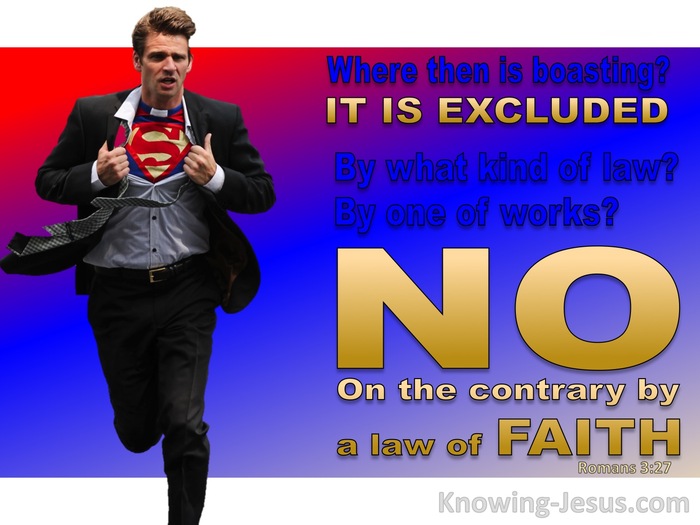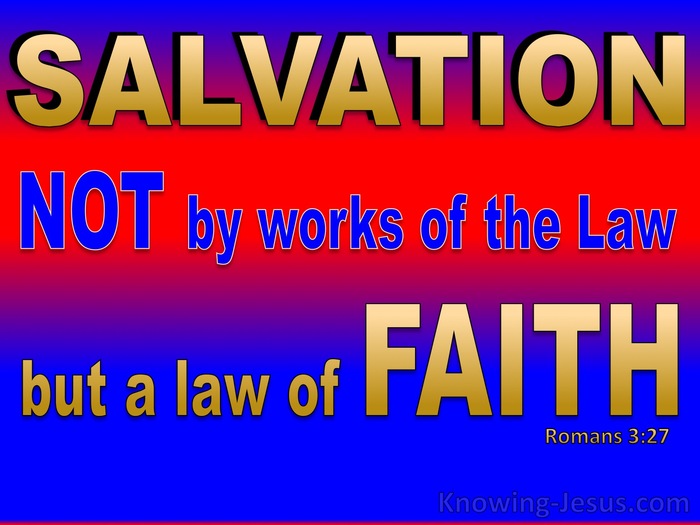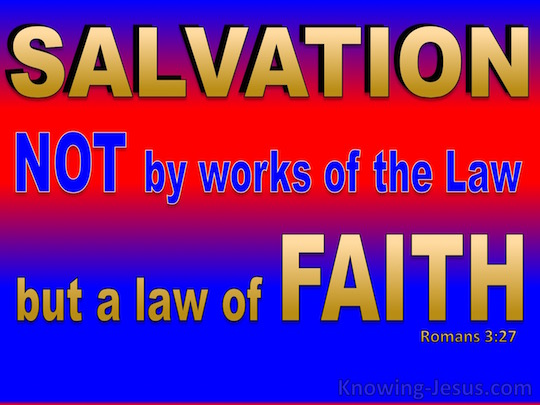Parallel Verses
Amplified
Then what becomes of [our] boasting? It is excluded [entirely ruled out, banished]. On what principle? On [the principle of good] works? No, but on the principle of faith.
New American Standard Bible
Where then is
King James Version
Where is boasting then? It is excluded. By what law? of works? Nay: but by the law of faith.
Holman Bible
Where then is boasting?
International Standard Version
What, then, is there to boast about? That has been eliminated. On what principle? On that of actions? No, but on the principle of faith.
A Conservative Version
Where then is the boasting? It is excluded. By what law, of works? No, but by a law of faith.
American Standard Version
Where then is the glorying? It is excluded. By what manner of law? of works? Nay: but by a law of faith.
An Understandable Version
Where then is the [basis for] boasting [i.e., over being right with God]? There is not any. Is it by [obedience to] a law? Is it by doing certain deeds? Not at all, but by a law of faith.
Anderson New Testament
Where, then, is boasting? It is excluded. By what law? Of works? No; but by the law of faith.
Bible in Basic English
What reason, then, is there for pride? It is shut out. By what sort of law? of works? No, but by a law of faith.
Common New Testament
Where then is our boasting? It is excluded. On what law? On the law of works? No, but on the law of faith.
Daniel Mace New Testament
what reason then is there for boasting? it is excluded. what, by the ceremonial law? no: but by the law of faith.
Darby Translation
Where then is boasting? It has been excluded. By what law? of works? Nay, but by law of faith;
Godbey New Testament
Then where is boasting? It is excluded. By what law? of works? No; but by the law of faith.
Goodspeed New Testament
Then what becomes of our boasting? It is shut out. On what principle? What a man does? No, but whether a man has faith.
John Wesley New Testament
Where is boasting then? It is excluded. By what law? Of works?
Julia Smith Translation
Where then boasting? It was excluded. By what law? of works? No: but by the law of faith.
King James 2000
Where is boasting then? It is excluded. By what law? of works? Nay: but by the law of faith.
Lexham Expanded Bible
Therefore, where [is] boasting? It has been excluded. By what kind of law? Of works? No, but by a law of faith.
Modern King James verseion
Then where is the boasting? It is excluded. Through what law? Of works? No, but through the law of faith.
Modern Spelling Tyndale-Coverdale
Where is then thy rejoicing? It is excluded. By what law? By the law of works? Nay: but by the law of faith.
Moffatt New Testament
Then what becomes of our boasting? It is ruled out absolutely. On what principle? On the principle of doing deeds? No, on the principle of faith.
Montgomery New Testament
Then what becomes of boasting? It is shut out. What sort of law forbids it? A law of works? No, but a law of faith.
NET Bible
Where, then, is boasting? It is excluded! By what principle? Of works? No, but by the principle of faith!
New Heart English Bible
Where then is the boasting? It is excluded. By what manner of law? Of works? No, but by a law of faith.
Noyes New Testament
Where then is the boasting? It is excluded. By what law? of works? Nay; but by the law of faith.
Sawyer New Testament
Where then is the boasting [of the Jew]? It is excluded. By what law? Of works? No; but by the law of faith.
The Emphasized Bible
Where, then, the boasting! It is excluded. Through what kind of law? Of works? Nay! but through a law of faith:
Thomas Haweis New Testament
Where then is boasting? It is excluded. By what law? of works? No: but by the law of faith.
Twentieth Century New Testament
What, then, becomes of our boasting? It is excluded. By what sort of Law? A Law requiring obedience? No, a Law requiring faith.
Webster
Where is boasting then? It is excluded. By what law? of works? No; but by the law of faith.
Weymouth New Testament
Where then is there room for your boasting? It is for ever shut out. On what principle? On the ground of merit? No, but on the ground of faith.
Williams New Testament
So where has human boasting gone? It was completely shut out. On what principle? On that of doing something? No, but on the principle of faith.
World English Bible
Where then is the boasting? It is excluded. By what kind of law? Of works? No, but by a law of faith.
Worrell New Testament
Where, then, is the boasting? It was excluded. By what manner of law? Of works? Nay; but by a law of faith.
Worsley New Testament
Where then is boasting? it is excluded: by what law? of works? no: but by the law of faith.
Youngs Literal Translation
Where then is the boasting? it was excluded; by what law? of works? no, but by a law of faith:
Themes
Interlinear
Dia
Dia
References
Word Count of 37 Translations in Romans 3:27
Prayers for Romans 3:27
Verse Info
Context Readings
Boasting Excluded
26 It was to demonstrate His righteousness at the present time, so that He would be just and the One who justifies those who have faith in Jesus [and rely confidently on Him as Savior]. 27 Then what becomes of [our] boasting? It is excluded [entirely ruled out, banished]. On what principle? On [the principle of good] works? No, but on the principle of faith. 28 For we maintain that an individual is justified by faith distinctly apart from works of the Law [the observance of which has nothing to do with justification, that is, being declared free of the guilt of sin and made acceptable to God].
Cross References
Romans 2:23
You who boast in the Law, do you [repeatedly] dishonor God by
Romans 4:2
For if Abraham was justified [that is, acquitted from the guilt of his sins] by works [those things he did that were good], he has something to boast about, but not before God.
1 Corinthians 1:29-31
so that no one may [be able to] boast in the presence of God.
Romans 2:17
But if you bear the name “Jew” and rely on the Law [for your salvation] and boast in [your special relationship to] God,
Ezekiel 16:62-63
And I will establish My covenant with you, and you will know [without any doubt] that I am the Lord,
Ezekiel 36:31-32
Then you will remember [clearly] your [own] evil ways and your deeds that were not good, and you will loathe yourselves in your own sight for your sins and for your outrageous atrocities.
Zephaniah 3:11
“On that day you [Israel] will feel no shame
Because of all your acts
By which you have rebelled and sinned against Me;
Then I will remove from among you
Your rejoicing ones who delight in their pride;
And you will never again behave arrogantly
On My holy mountain [Mount Zion].
Mark 16:16
Luke 18:9-14
He also told this parable to some people who trusted in themselves and were confident that they were righteous [posing outwardly as upright and in right standing with God], and who viewed others with contempt:
John 3:36
He who believes and trusts in the Son and accepts Him [as Savior] has eternal life [that is, already possesses it]; but he who does not believe the Son and chooses to reject Him, [disobeying Him and denying Him as Savior] will not see [eternal] life, but [instead] the wrath of God hangs over him continually.”
Romans 3:19
Now we know that whatever the Law [of Moses] says, it speaks to those who are under the Law, so that [the excuses of] every mouth may be silenced [from protesting] and that all the world may be held accountable to God [and subject to His judgment].
Romans 7:21
So I find it to be the law [of my inner self], that evil is present in me, the one who wants to do good.
Romans 7:23
but I see a different law and rule of action in the members of my body [in its appetites and desires], waging war against the law of my mind and subduing me and making me a prisoner of the law of sin which is within my members.
Romans 7:25
Thanks be to God [for my deliverance] through Jesus Christ our Lord! So then, on the one hand I myself with my mind serve the law of God, but on the other, with my flesh [my human nature, my worldliness, my sinful capacity—I serve] the law of sin.
Romans 8:2
For the law of the Spirit of life [which is] in Christ Jesus [the law of our new being] has set you free from the law of sin and of death.
Romans 9:11
and though the twins were not yet born and had not done anything either good or bad, so that God’s purpose [His choice, His election] would stand, not because of works [done by either child], but because of [the plan of] Him who calls them,
Romans 9:32
And why not? Because it was not by faith [that they pursued it], but as though it were by works [relying on the merit of their works instead of their faith]. They stumbled over the stumbling Stone [Jesus Christ].
Romans 10:5
For Moses writes that the man who practices the righteousness which is based on law [with all its intricate demands] shall live by it.
Romans 11:6
But if it is by grace [God’s unmerited favor], it is no longer on the basis of works, otherwise grace is no longer grace [it would not be a gift but a reward for works].
1 Corinthians 4:7
For who regards you as superior or what sets you apart as special? What do you have that you did not receive [from another]? And if in fact you received it [from God or someone else], why do you boast as if you had not received it [but had gained it by yourself]?
Galatians 2:16
yet we know that a man is not
Galatians 3:22
But the Scripture has imprisoned
Ephesians 2:8-10
For it is by grace [God’s remarkable compassion and favor drawing you to Christ] that you have been saved [actually delivered from judgment and given eternal life] through faith. And this [salvation] is not of yourselves [not through your own effort], but it is the [undeserved, gracious] gift of God;
1 John 5:11-12
And the testimony is this: God has given us eternal life [we already possess it], and this life is in His Son [resulting in our spiritual completeness, and eternal companionship with Him].






